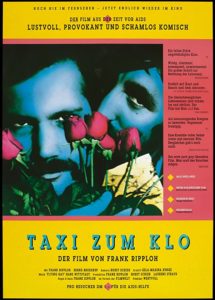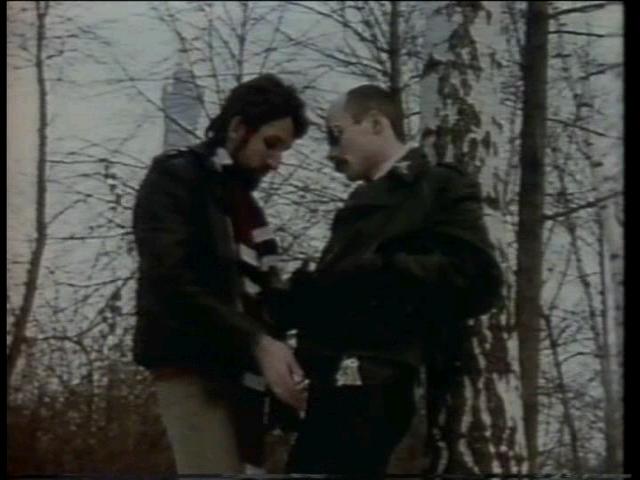Taxi Zum Klo (1981)
“I’m your normal, tired, neurotic, polymorphously perverse teacher.”
|
Synopsis: |
|
Genres, Themes, Actors, and Directors:
Response to Peary’s Review: Taxi Zum Klo (which translates into “Taxi to the [Public] Toilet”) is especially effective at showing how Ripploh was able to keep his sex life completely separate from his career as a schoolteacher. In one particularly overt instance, Ripploh cross-cuts between innocent shots of his tutoring session with a young male student, and his transvestite friend commenting disparagingly while watching a cautionary school film about a pedophile. It may be a heavy-handed message, but it’s an important one — and it works within the context of the film’s unabashed presentation of explicit gay male sexuality (surely an eye-opener for many at the time). Redeeming Qualities and Moments: Must See? Categories
Links: |


One thought on “Taxi Zum Klo (1981)”
Oddly enough, I don’t consider this must-see.
“Can we do anything but simply repeat ourselves?”, Ripploh ultimately asks himself in conclusion. Frankly, I’m surprised he stopped long enough to ask himself such a question. Because, in his case, I was already more than convinced he would never be able to.
I have the impression this film has been more or less out of circulation for a number of years. (I’ve just rewatched, as it has popped up on IW at Netflix.) I saw it on release in NYC (and perhaps once later on video). It is very much of its time: when free gay love – or, rather, sex – exploded in major cities. (There is only a hint of disease in the film, but not a whisper of the epidemic that would soon put chains on the freedom this film exploits.)
‘TZK’ was one of a handful of films, at the time, that all gay people seemed to be talking about. But, looking at the film now, I think the viewers’ excitement over it had more to do with what was happening in their personal lives than what was on-screen.
I don’t feel ‘TZK’ has held up well, mainly because I don’t think it’s very much of a film. And also because Ripploh simply does not come off as a very nice person (or a particularly competent teacher, frankly). That’s not because he chooses non-stop sex with strangers over partnership. It’s simply because he’s just not nice. There’s precious little that is redeeming in the persona he presents to us. I remember when I first saw the film that I felt bad for Ripploh’s live-in lover Bernd (who is often quite charming, actually). Even though Ripploh is shown having private moments (well, at least one) in which he worries that Bernd will leave him, his treatment of Bernd, overall, is rather awful. (At one point, Ripploh flat out calls Bernd boring.) The reality, of course, is that neither one of them knew what they were taking on when they attempted partnership and they both clearly had different views about it. So, of course, things were going to play out as we witness them.
There’s very little in ‘TZK’ that I find even remotely humorous – yet, at the same time, there appears to be an underlying, desperate attempt to ‘entertain’…as well as shock (i.e., with close-ups of 69, s&m, watersports). The grand finale of the drag show leading to Ripploh’s self-disclosure in his classroom just, to me, reads sad. There’s no joy in any of this so-called ‘freedom’.
I see this less as a cult film (who would want to keep going back to it out of enjoyment, and why?) and more of an odd duck that had the benefit of timing.